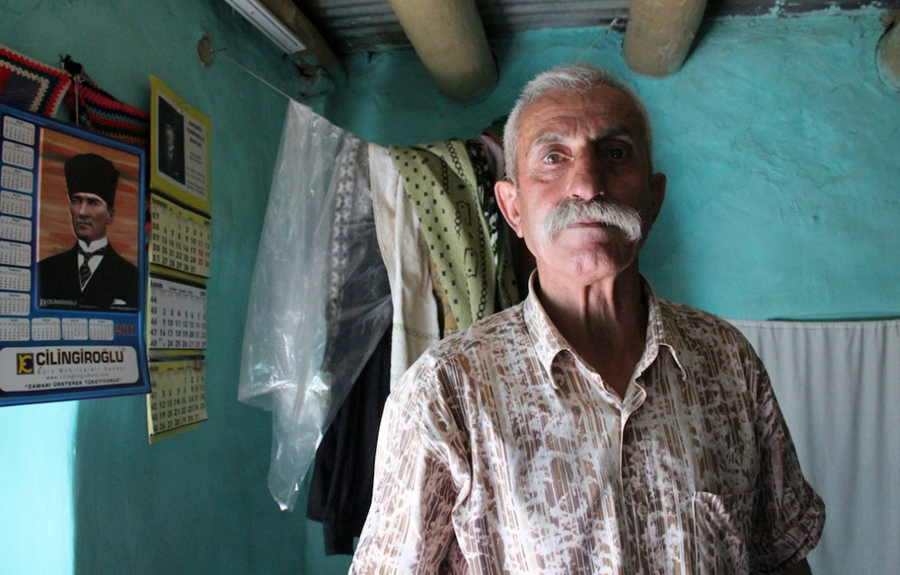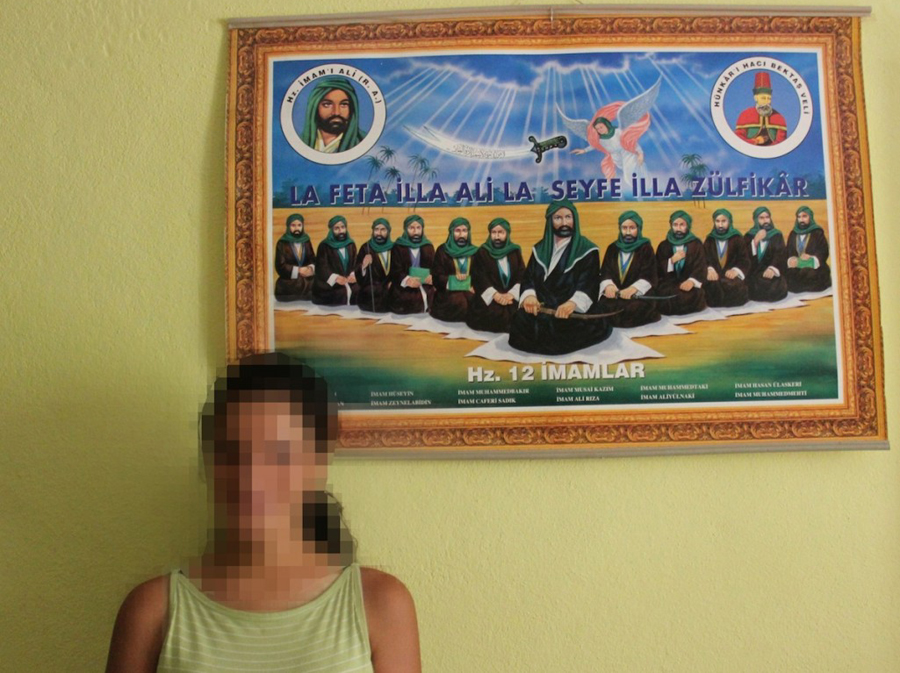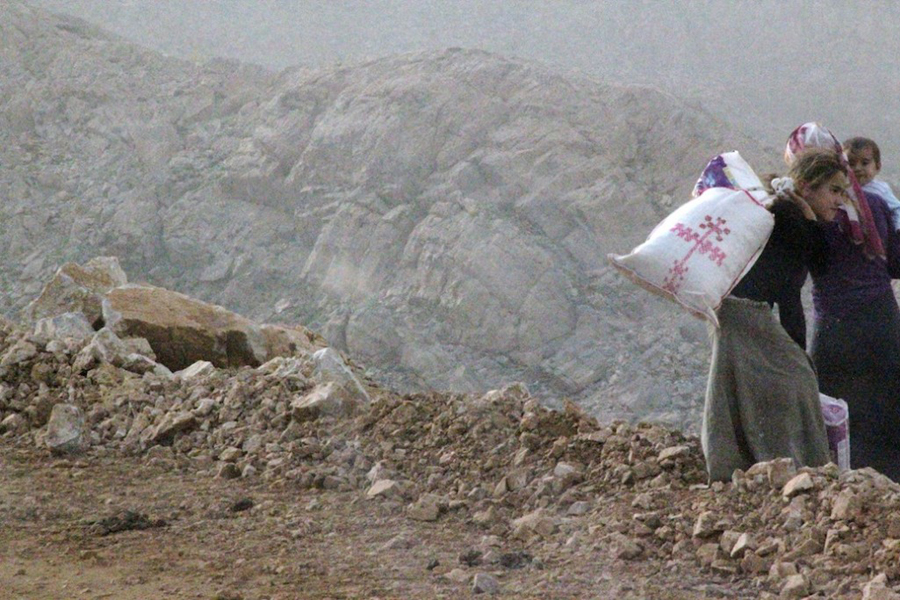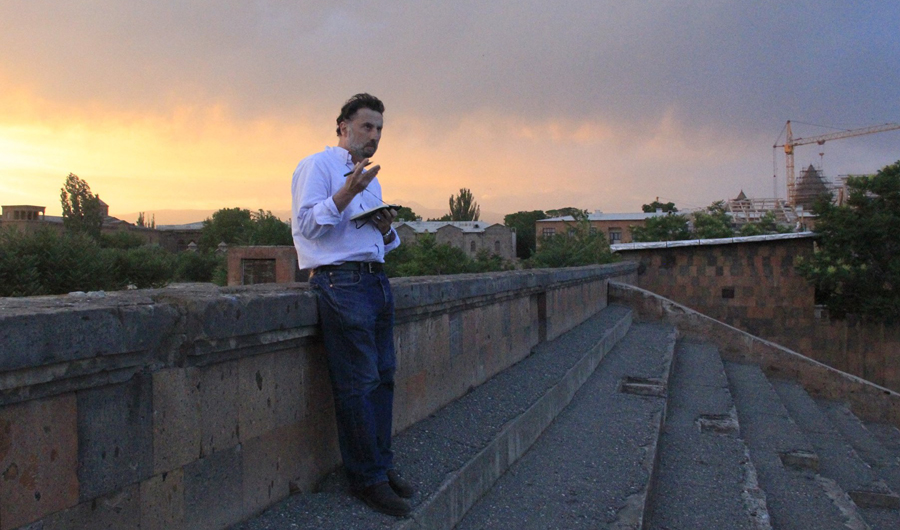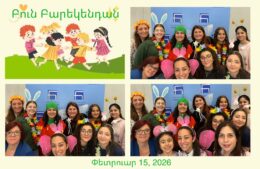Interview with Avedis Hadjian, Author of ‘Secret Nation: The Hidden Armenians of Turkey’
- (0)
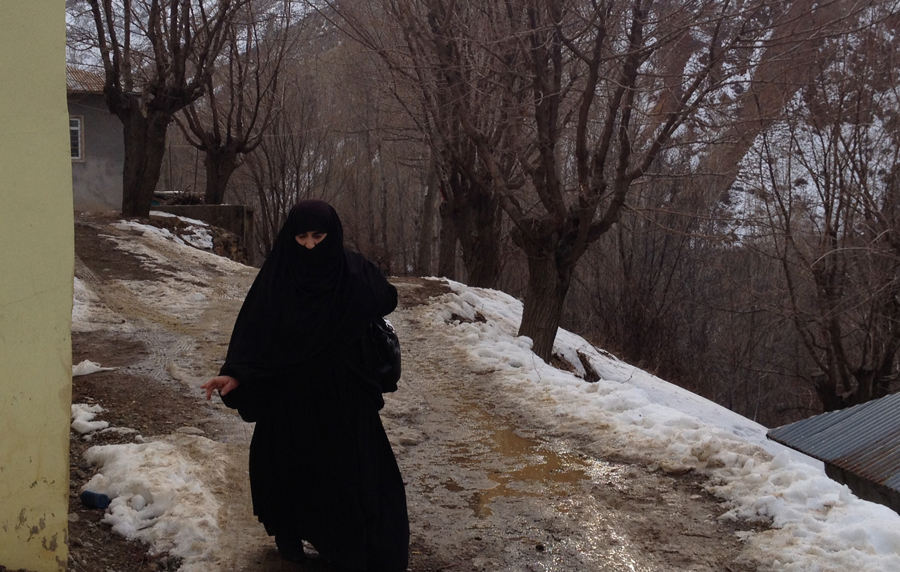
By Goryoun Kouyounian
Horizon Weekly
Avedis Hadjian is a writer based in New York. He has published in the Los Angeles Times, CNN, Bloomberg News and other newspapers and news sites.
Call it “life after the apocalypse”. The genocide of 1915 delivered what seemed to be a near-death blow to Armenian presence in the Anatolian lands. Not all, however, succumbed to the binary fate of death or exile. Some, in fact, have managed to survive over the last hundred years or so by concealing their identity, which in most cases involved converting to Islam and assimilating into Turkish society. In Secret Nation: The Hidden Armenians of Turkey, Armenian-American journalist and author Avedis Hadjian travels to towns and regions that once comprised “historic Armenia”, where so many Armenians used to call home. His book is filled with fascinating stories of day-to-day struggle and trials that leave the reader pondering questions about the meaning of Armenian identity and Armenians’ relationship with the various ethnic and religious groups of Turkey. In the following email interview, I explore such questions and more with the author himself, Avedis Hadjian.
- You write how the current Turkish descent into mass repression mirrors the ostensibly reformist Young Turks’ gradual adoption of genocidal designs against the Armenian community about a century earlier. I’m reminded of a similar comment by Turkish-Armenian parliamentarian Garo Paylan, who once noted how Erdogan’s increasingly assertive authoritarianism presages a dangerous era for the Turkish-Armenian community, much as it was around 1915. Are you fearful for the fate of the remnants of Armenian presence, be it hidden or expressed, in their ancestral homeland?
It is probably not an overstatement to say that the condition of Armenians in the Ottoman Empire and Turkey has always been precarious, when not compromising on an existential level. Notwithstanding the courage of politicians like Garo Paylan, the murdered journalist Hrant Dink and many other Armenian community leaders and intellectuals, Turkey has no longer any reason to see Armenians as a threat to the territorial integrity. With the Genocide, Armenians have become the tiniest minority in their own land—and I mean here Western Armenia and Cilicia. Violence targeted specifically at Armenians in Western Armenia and Cilicia would not have any sense except in the mind of extremely paranoid Turkish decision-makers (and those do exist). It would also be, quite literally, very difficult to carry out. Any action against Armenians in the historical provinces would have to be pin-pointed police operations rather than sweeping round-ups and mass murder, because there are very few of them left, scattered all over the territory. We are sometimes talking about individuals of mixed ancestry who are aware of an Armenian origin and little else: no historical memory; no Armenian political claims; Islamicized.
At the same time, it is true that the Islamist-nationalist, authoritarian streak of the Erdoğan regime does not bode well for Armenians generally and the active community in Istanbul. The Armenian community and its institutions (churches, schools, etc.), as well as the Greek and the Jewish ones, have been functioning since 1924 under the protections afforded by the Treaty of Lausanne, which expires in 2023 (it was signed in 1923 but entered into force a year later). By simply letting the provisions drop and not renewing them, Turkey would deal a massive blow to Armenians and the other minorities. Now it would not make much political sense and would attract a disproportionate backlash from the international community, but eventually outrage dies down and most governments in the world get away with reprehensible measures or even with crime, and there is no need to back this statement up with examples: there are simply too many. Having said that, the biggest danger that Armenians now face in Turkey is simply assimilation: mixed marriages have been common for years now, the language is falling into disuse and all the other challenges that Diaspora communities face.
Jazo Uzal, the last Armenian of Nish, a village in the mountains of Mush. / © A. Hadjian
- In the first stage of your journey, you visit Sasun, home of the mythical “Sasuntsi Davit”. The legendary figure is typically viewed as an anchor sustaining Armenian national identity. What, in your view, is the relevance of “Sasuntsi Davit” to modern-day Sasun Armenians, many of whom simply do not share the same level of attachment, if at all, to Armenian-ness as others do? Has the myth, in a way, outlived its usefulness?
Are utilitarian considerations what bring a myth into life? Sasuntsi Davit is a keystone in Armenian oral history much of which has been lost. Sadly, most Sasun Armenians have now only a vague notion about it. I interviewed the last known Sasuntsi Armenian who could still recite verses by heart in the winter of 2013 and he passed away shortly after. It is still not very uncommon to find adult Sasuntsis who know a verse or two, or at least that Davit flew to the sun on his horse. But Sasuntsis are a very brave and proud breed of Armenians and for those who know of Sasuntsi Davit—and actually believe he was a historical figure as opposed to a mythical one—it adds up to their sense of integrity and courage. That there are still Armenians in the mountains of Sasun—remember that the first systematic massacres against Armenians in the Ottoman Empire began there in the 19th century—attests to their indomitable character. It is no coincidence that the myth of Sasuntsi Davit was spawned in Sasun. As an aside, I would say that the other region of Western Armenia known for its invincible spirit was Zeytoun, and it is no coincidence that Zeytoun is believed to have been first colonized by Sasuntsi Armenians more than a millennium ago. So, if I may, I would add in Armenian: «Կեցցէ՛ Զէյթունը, խրոխտ Սասունը» (“Long live Zeytoun and the fearless Sasun”).
- While the Armenian genocide was designed for the purpose of creating a “pure” Turkish nation-state, the genocide itself was made possible largely through appeals to religious identity. Is there a sense in you that Erdogan’s enhanced presidency perhaps signals a return to such pre-national times where Islam was the common denominator in Turkey, taking precedence over Turkishness? Where would Islamicized Armenians fit into such a design?
Yes, Erdoğan’s regime has a clear and declared Islamist nature and, yes, it has pan-Islamist aspirations, too. Its neo-Ottoman discourse and goals—which may be exposed as pipedreams in due course— reveal imperialist ambitions. Islamicized Armenians fit like a glove in such a decision but only in the case of those who have truly converted: for those, according to the testimonies I collected, Islamic identity does take precedence over their Armenian identity. You may not rule out that there is a whole spectrum out there of all types of attitudes and ideas about this, but generally this would seem to be the case. There are also those Armenians whose conversion is a cosmetic affair and who may eventually assimilate into Turkish society but who may also return to the Armenian community. But what has been earning Erdoğan 50% of the vote in the last decade has been a combination of Islamist discourse and undiluted Turkish nationalism, which is always extreme and racist. Yet yes, converted Armenians—when conversion has been thorough—do fit into this design.
An Armenian woman at home in Dersim, posing with a picture of the Twelve Imams. She found out she was Armenian at the age of 15. To strangers, she is an Alevi Zaza, but her friends and neighbors in Dersim know she’s Armenian and Christian. She says she is not afraid to be known as an Armenian in Dersim, “but I would fear for my life if they found out at the university,” where she studies as an undergraduate in Economics./ © A. Hadjian
- For many of the “hidden” Armenians you’ve met throughout your journey, the genocide did not end in 1915 but rather continued on well into the 1950s and 60s and onwards, much in contrast to Diasporan Armenians. Has 1915 been drowned out in significance for these Islamicized Armenians in the midst of this decades-long experience of continued persecution and insecurity?
I would not believe that the 1915 Genocide would have drowned out in significance for any Armenian who considers himself such. It was the seminal catastrophe. We may discuss as to how to move forth from now—but that’s a different conversation. For everyone, and especially for those who well into the 1960s were still resisting onslaughts, the Genocide looms large. It all began there, as they know very well, for they are more directly still experiencing its consequences a century later.
- Ethnic Armenians in Turkey, including those who’ve abandoned their ancestral identity and language, are still treated “as if” they were Armenians. By and large, they’re prevented from climbing up the ladder of power, and the government keeps track of their true origins whether they change their identity or not. Did you sense some frustration with this treatment, and could this Turkish policy eventually have the unintended effect of forcing them into re-asserting Armenian identity?
Yes and yes. Yes, there is frustration, and yes, there is exclusion against Armenians. The institutional discrimination of the Turkish state and the casual racism of neighbors and common folk have been a major determinant in preventing or delaying the assimilation of Armenians, especially the Islamicized.
Secret Armenian pilgrims at Mt. Maruta, Sassoun. The young girl was scared when I approached her after seeing the embroidered Armenian cross in her bag, which she turned to the other, blank side. “We are Muslim,” said her mother, when asked whether they were Armenian./ © A. Hadjian
- You recount how most of the Armenians you met in Turkey, contrary to those in the Diaspora, view Hrant Dink’s assassination in 2007 cynically, as a warning not to follow his path. At the same time, many of them are now willing to reassert, albeit often cautiously, their Armenian identity. Do you think that, perhaps, their overt cynicism might actually reflect a deeper, rather uneasy admiration of Hrant Dink’s legacy?
I think it would be too sweeping a statement to say that most Armenians I met in Turkey viewed Hrant Dink’s murder cynically. On the contrary, there is universal admiration for him among Armenians and for standing up to the negationist discourse and asserting Armenians’ rights. Yet yes, some people who are in their 50s or 60s, and who are aware of how the politics of identity and human rights play out in Turkey would warn me not to be naïve about the true nature of the Turkish state and society for the following reason: it was a shock for many of us in the Diaspora to see the massive demonstrations of solidarity with Armenians in Istanbul after Dink’s murder. We realized many of those people were probably Turks and Kurds, or non-Armenians. It did seem like the harbinger of a new era, at least at the grassroots level: it did indicate that a dialogue between Armenians and Turks would be possible, that they knew the history and they were appalled by it. But some of those Armenians in Turkey with whom we discussed about Hrant Dink’s legacy were telling me that the displays of support and sympathy for the Armenians were only one side of the story, warning me that there were a lot of Turks who loathed Armenians and that the lot of Armenians has not necessarily improved. Yet they were all for what Hrant Dink did and did not see his murder as a warning not to pursue the path of truth and justice. On the contrary, they saw in him a hero and a martyr, who did in Turkey what needed to be done and still needs to be done.
The Author Avedis Hadjian
- Some reform-oriented politicians in Turkey argue that the country, given both its size and its remarkable ethnic and religious pluralism, would be well served under a more decentralized, officially multicultural political system. Could that be considered a viable solution to some of Turkey’s persistent social discords?
That is a model advocated by Abdullah Öcalan, the leader of the PKK, of decentralized democracy or federalism. Yes, on paper it would work, but it would not be a stretch to say that at this point in history is utopian. The Turkish state will never allow for that: Turkey and its preceding Turkish state—the Ottoman Empire—have always been heavily centralized, multiethnic states. Modern Turkey is still an empire in all but name: a territory ruled by a group that almost exclusively came from the conquering nation that appropriated the lands of the original peoples—mostly Greeks, Armenians and Assyrians—who were mostly exterminated or displaced and whose remnants are excluded from the levers of power. Moreover, Turkey is a state that has a country within it, rather than the opposite: i.e., a nation that developed institutions that eventually coalesced into a state. Turkey, and the Ottoman Empire for that matter, were born as states, and like every state, or living organism for that matter, they tend towards self-preservation. It has done so for centuries at the cost of massive bloodshed. Not only it can afford it without any significant threat to its existence: it may even be argued that Turkey needs a permanent state of violence, actual or potential, in order to survive as a centralized and highly-militarized state. The raison d’être of Turkey is to assert the power of the state, by the state and for the state, but not necessarily for the people. The Turkish state is potentially or actually against the people, especially non-Turkish and non-Muslim minorities.
As for the Kurdish democratic decentralization, it does sound fine but I suspect it may be disingenuous. For a people that have been yearning for so long to have their own independent country, the first thing they would do if such a goal was attained would be to hoist the Kurdish flag and become a nation-state. And even if the Kurdish ruling classes and the society truly wanted a decentralized federation—I don’t believe that for a second—they would be forced to become a regular country in such a neighborhood, and a heavily armed one, too. Mind you, those territories in modern-day Turkey claimed for a potential Kurdish state were cleansed of Armenians by Kurdish tribes and individuals who were complicit with the Turkish state in the Hamidian massacres and the Genocide. And they did so to appropriate those lands: claiming that they were “ignorant” and that they were played by the Turks is an excuse that does not pass muster. The Turks only played them in the sense that they did not give the Kurds political autonomy. In other words, Turks did not keep their end of the bargain. But the Kurds who took part in the massacres knew full well what they were doing and for what reasons. Those Armenians who take at face value the pro-Armenian discourse of Kurdish political movements in the last two or three decades should bear in mind the compact that bound Turks and Kurds for four centuries until the foundation of modern Turkey by Kemal Atatürk stripped Muslims of their special rights. That, and not Kurdish nationalism per se, was what initially triggered the first Kurdish rebellion that evolved into the current rebel movement. Sheik Said, the Kurdish agha that led the first Kurdish uprising against Atatürk in 1925, had been an active perpetrator of the Armenian Genocide and he rose up against the Turkish state because the Caliphate had been abolished and, with it, the privileges that Muslim subjects enjoyed under it and from which the Kurdish tribes benefited enormously for centuries at the expense of Armenians.
- A frequent response you hear throughout your journey from Islamicized Armenians who don’t identify as Armenians is that because they’re Muslim, therefore they can’t be Armenian. Others, though, have no issue identifying as both. What accounts for this common conflation of religion with nationality and ethnicity?
That is still a phantom limb, so to speak, of the millet system that dates back to the Ottoman Empire, whereby religion is affiliated with nationality: “Armenian” equals “Christian” (rather than an ethnic or national identity). Yet oftentimes this was a somewhat defensive way of avoiding undesirable associations in places where those Armenians might be at risk for their origins.
- Some non-Armenian residents expressed their surprise at the lack of Armenians returning to their homes in eastern Anatolia. Did such statements catch you off guard? Does the idea of “Western Armenia”, in a way, seem more plausible in the minds of those non-Armenians than in the minds of Diasporan Armenians themselves?
It did often catch me off guard. I would not think for a moment that the people who were enquiring about that had a vision of Western Armenia in mind but rather Armenians returning to their homes and properties as good neighbors, not as the lords of the country. Some of it may have been a polite manner of flattery but some, too, may be that the perspective of the victim may very well be at variance with that of those who did not endure the Genocide. Without any spirit to offend, these very people would also express curiosity as to why Armenians still preserve the memory of events that unfolded a century ago so vividly. I am loath to make comparisons but I would say most descendants of Europeans or generally immigrants in the Americas are not very intimately aware of the sufferings endured by the aboriginal populations, native Americans or descendants of people who were brought into those lands as slaves. That is as abominable as it can get and yet people who did not endure it have a tendency to move on and to expect victims and descendants to do so as well.
In all fairness, I think many Turks—including many who are descendants of those brought in from Greece, Macedonia and other places in the Balkans after the population exchanges following World War I, after the Genocide—may see the Genocide as a historical episode that happened a long time ago, in which not even their ancestors took part—they were elsewhere at the time, as were Armenians’ during the Europeans’ conquest and colonization of the Americas—and, after a lifetime of government-sponsored, relentless propaganda, conflate it with World War I and a period of tumultuous events everywhere and have a casual incapacity to understand the enormous suffering implicit in the extermination of a nation, that four or five generations on is still reeling from it, and justly so, for existential reasons.
- One of the concerns with respect to nationalism, one you hear in your journey, is that it’s a powerfully dividing force. You argue that Armenians, for better or worse, cannot afford the luxury of thinking through an internationalist ideological prism, given their persecution at the hands of oppressors for centuries. Do you think there’s a necessary trade-off between the degree of nationalism Armenians embrace and the level of inclusion we grant hidden Armenians throughout Turkey?
This is very hard to respond, I would say, because those attitudes evolve over time. A Diaspora organization or the government of Armenia may outline policies towards hidden Armenians, but we do not know how the views of Armenians—or any other people, for that matter—will develop over time. I think the answer would be “yes”, if only because there would seem to be a natural tendency towards it, yet it is anybody’s guess how things will pan out. History never is what its actors intended.
